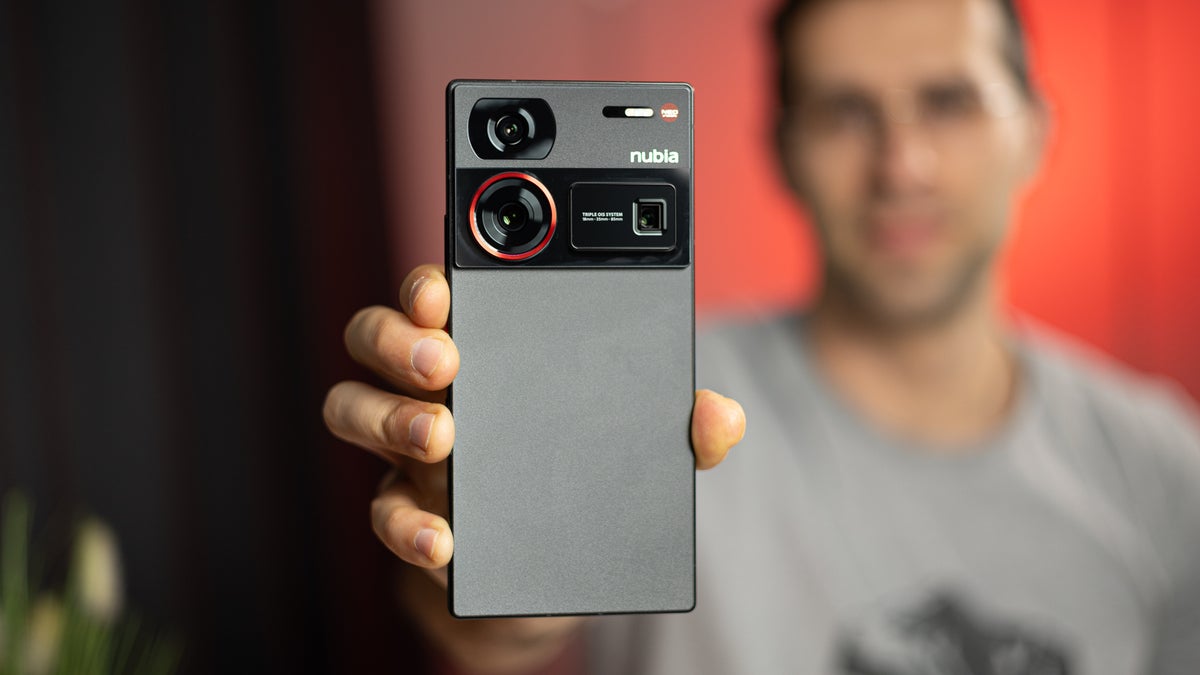Nubia Z60 Ultra Intro
There’s one key feature that makes this phone stand out next to your regular Galaxies and iPhones. It’s not boring. So, without further ado, let’s dive! Oh, and by the way, the Nubia Z60 Ultra is available globally (including in the US), and you can get one from the Nubia store for as low as $599.
What’s new about the Nubia Z60 Ultra
- Under-display selfie camera
- Edge-to-edge 6.8-inch AMOLED screen
- Snapdragon 8 Gen 3 processor
- 50/64/50MP triple camera system
- 6,000mAh battery
Table of Contents:
Nubia Z60 Ultra Specs
Impressive on paper
The specs sheet looks very impressive, at least on paper. The Nubia Z60 Ultra aims to tick all the boxes with the latest Snapdragon processor, an ample camera system, a huge battery, and the edge-to-edge screen we keep on blabbering about. However, it remains to be seen how well these specs translate into real-world performance.
| Specs | Nubia Z60 Ultra |
|---|---|
| Size and Weight | 164 x 76.4 x 8.8 mm 246 grams |
| Display | 6.8″ OLED 120Hz, HDR10+ 1,500 nits peak brightness |
| Processor | Snapdragon 8 Gen 3 |
| Software | Android 14 MyOS 14 |
| Cameras | 50MP main, f/1.6 aperture 50MP ultra-wide, f/1.8 64MP 5X zoom, f/3.3, 3.3x optical zoom 12MP front, under-display |
| Battery Size | 6,000 mAh |
| Charging Speeds | 80W via cable |
| Storage and Prices | 8/256GB for $599 12/256GB 12/512GB 16/512GB 16/1TB 24/1TB |
Nubia Z60 Ultra Design & Colors
That’s one big phone!
Design is subjective, of course, and this industrial-looking rectangular phone will most certainly find fans. Nubia has included a transparent plastic back cover in the retail package, and using it improves the situation with the sharp and edgy camera bump a lot.
Speaking of the camera bump, it takes more than ⅓ of the back, and it’s made to look like a point-and-shoot camera. It’s an interesting aesthetic, and it adds a unique touch to the overall design of the phone. For what it’s worth, you can’t call the Nubia Z60 Ultra a boring phone.
There’s a red power button under the volume rocker and a programmable switch button further down below. Currently, you can get the Z60 Ultra in Black and Silver, but there’s also a cool blue option called Starry Night that resembles a Van Gogh painting.
Nubia Z60 Ultra Unboxing
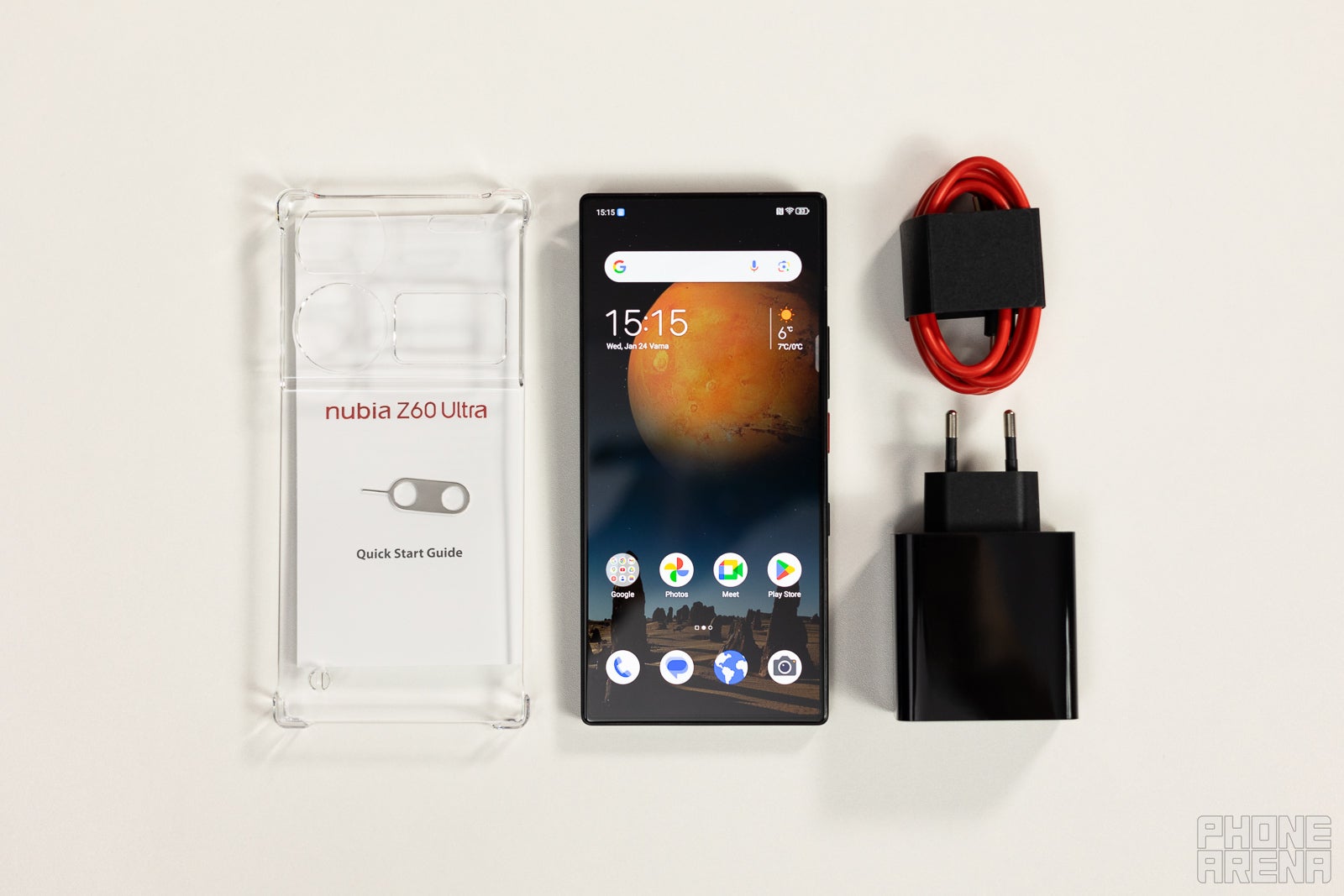
All the necessary accessories are in there
I personally don’t believe the eco-angle behind removing chargers, cables, and other stuff from the retail box, so it’s a pleasant surprise to find a lot of goodies inside the Z60 Ultra’s retail box. There’s the transparent back cover mentioned earlier; you’re getting an 80W fast-charging brick and a red USB-C cable. The phone also comes with a screen protector preinstalled, so you don’t have to worry about getting one separately.
Nubia Z60 Ultra Display
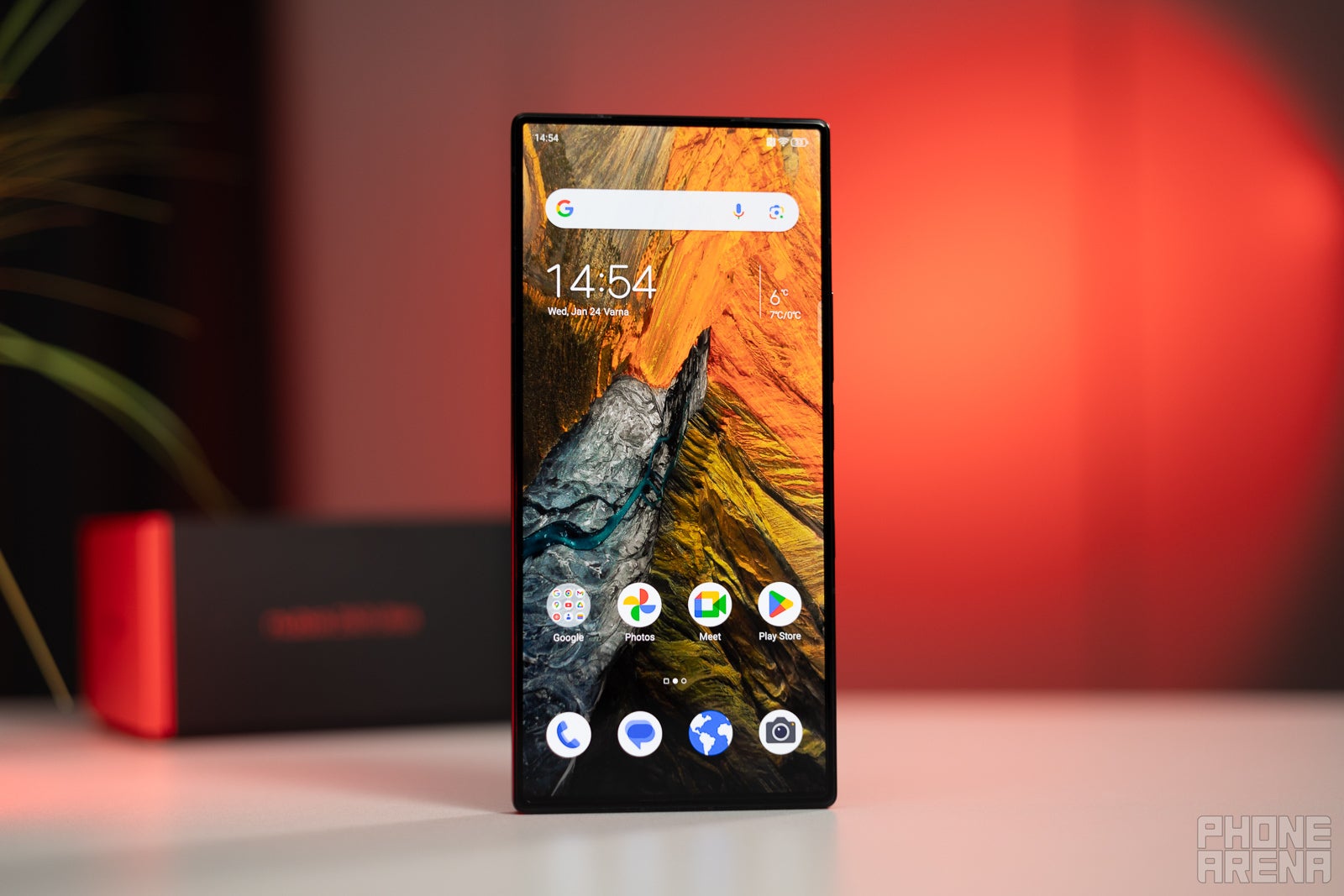
Huge display with an (almost) invisible selfie camera? Check!
Let’s talk about that big 6.8-inch AMOLED display. It feels huge when you’re coming from a 5.4-inch iPhone mini, but even when compared to more ordinarily sized phones, it still looks big. The resolution is 1116 x 2480 pixels, distributed at a 20:9 ratio, resulting in a pixel density of around 400 pixels per inch.
The display itself is great, bright, vivid, and crisp. Nubia advertises up to 1,500 nits of peak brightness, but we all know that these numbers don’t hold in real-life scenarios due to how peak brightness is measured. Under bright sunlight, we measured a maximum brightness of just over 1000 nits, which is absolutely fine.
The color accuracy is also pretty good at under 2 delta E. You can fine-tune the color temperature and mode, choose between 60 Hz and 120 Hz refresh rates, and also leave it on Auto for the phone to switch at will. This is not an LTPO screen, so there is no 1-120Hz dynamic refresh rate.
Display Measurements:
There’s also facial recognition, which works super quick but only relies on the front selfie camera, so the security side of it is a bit sketchy. The under-display selfie camera deserves a few words here. There are instances where you almost can’t see it, especially in a dark-lit room with a darker wallpaper or background.
That being said, it’s absolutely visible if you pay attention to it. Actually, in bright sunlight, there’s a sun icon appearing on the selfie camera. I’m not sure if it’s a feature to let you know where the camera is or just a clever trick to hide it when it’s bright outside.
Nubia Z60 Ultra Camera
A pretty decent package
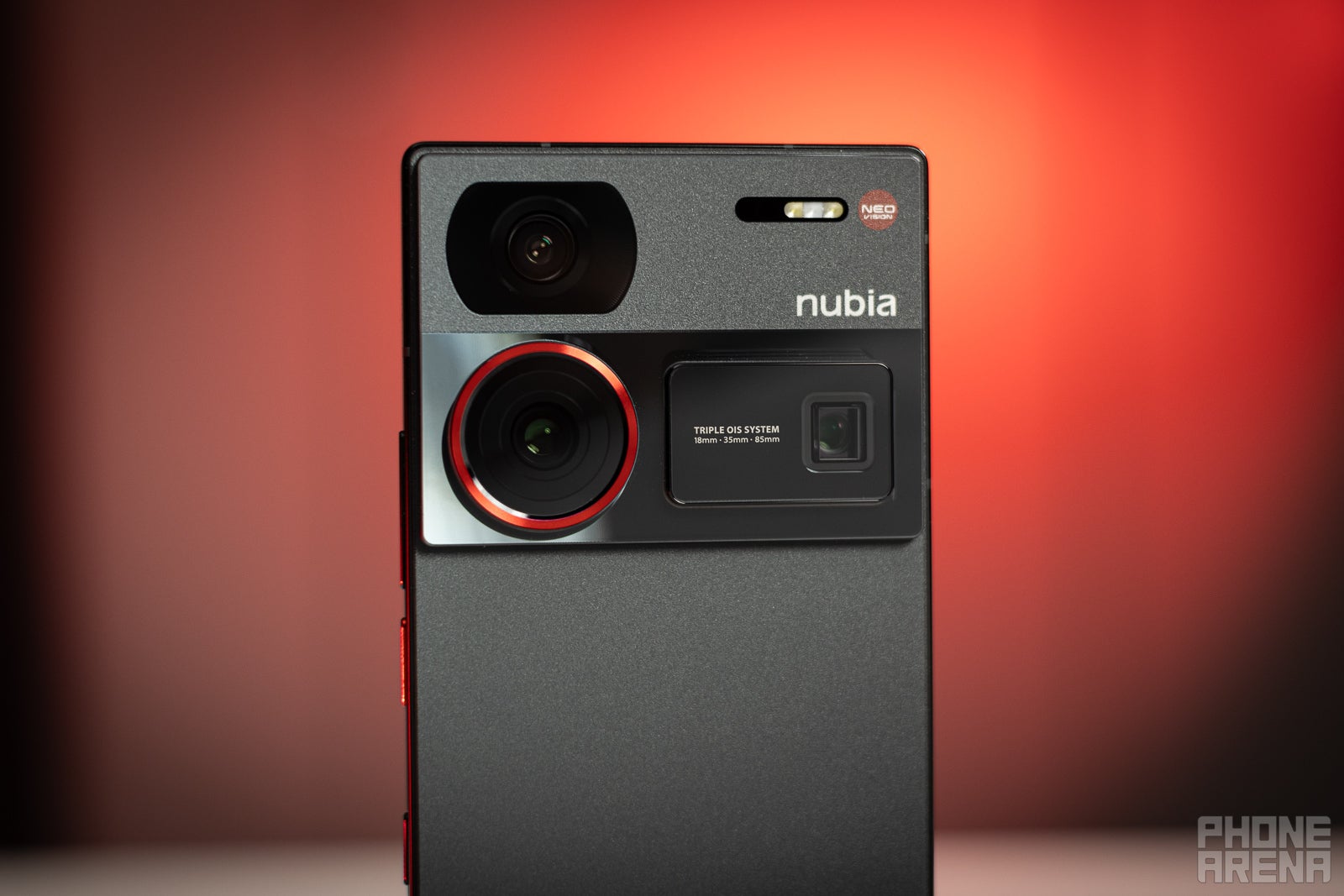
Three cameras and a point-and-shoot camera look
The Nubia Z60 Ultra comes with three cameras on the back, positioned in a quite auspicious camera bump. The design choice is deliberate, as it makes the phone look like a point-and-shoot camera from the past (we’ve said that too many times in this review). The cameras are quite good, following the latest trend to make uses of Sony’s flagship sensors in the main camera and an OmniVision for the periscope zoom one.
There’s an 18mm ultrawide lens, and the European version of the phone comes with a 12MP selfie camera, hidden under the main display. Let’s see how good these cameras perform.
Main Camera – Day
The camera system uses an AI assistant to switch between modes and offer you the best frame and setting, and for the most part it works pretty well. It can detect faces and offer you to switch to portrait mode, measure the focal distance and engage macro mode, and so on.
Main Camera – Low-light
Low-light shots are the usual affair, but unlike other Chinese smartphones (khm…Honor) that overexpose and brighten every night shot, the Nubia Z60 Ultra produces some really true-to-life low-light images. This is one of the phones that snapped night photos close to what I saw with my own eyes. There’s a dedicated night mode, and you can use that if you like, but if you leave everything on auto, there’s a better chance to get a decent shot.
Zoom Quality
The periscope zoom camera uses an OmniVision OV64B camera sensor, a popular choice of late for such type of systems. If we talk focal length, it offers an optical equivalent of 85mm, and when you add some sensor crop on top, you can get 170mm with near-optical quality. The resulting shots are great and they rival the main sensor in quality, detail, and sharpness. The zoom camera is useful for a lot of things, from portraits to snapping distant signs, and getting close when you need to. There’s no big drop in overall quality between 85 and 170mm, and while the zoom levels aren’t insane, the Nubia Z60 Ultra can snap amazing zoom shots at 3.3x and 6.6x.
Portrait Mode
Portrait mode is a mixed bag. We recommend using the zoom lens and just get close enough to create a natural bokeh effect. With the f/1.6 aperture this is rather easy. If you decide to use the dedicated portrait mode, you might smear parts of the object you want into the frame, and sometimes even get a misplaced focus on the background. For what it’s worth, you can change the virtual aperture to control the bokeh algorithms, but once again, we think you can make decent portraits without this software crutch.
Ultra-wide Camera
The ultrawide camera delivers decent results, with similar color tone to the main and telephoto cameras. What’s interesting is that in low-light this camera tends to produce wild glares, to the point where images are almost unusable.
Selfies
Time for the verdict on the under-display selfie camera. Is it any good? Well, it’s still way off other non-covered by a display front cameras but the technology is maturing slowly. When the lighting is uniform, you can get a good selfie out of this phone. But any strong light source would produce blur, overexposure, and sometimes double image artifacts. Another interesting thing is that the Nubia Z60 seems to apply beauty effects even when the setting is turned off. I personally don’t mind, but people with enough charisma on their own might want not to use the artificial enhancement.
Video Quality

Nubia Z60 Ultra Performance & Benchmarks
Hotter than hell and half of Georgia
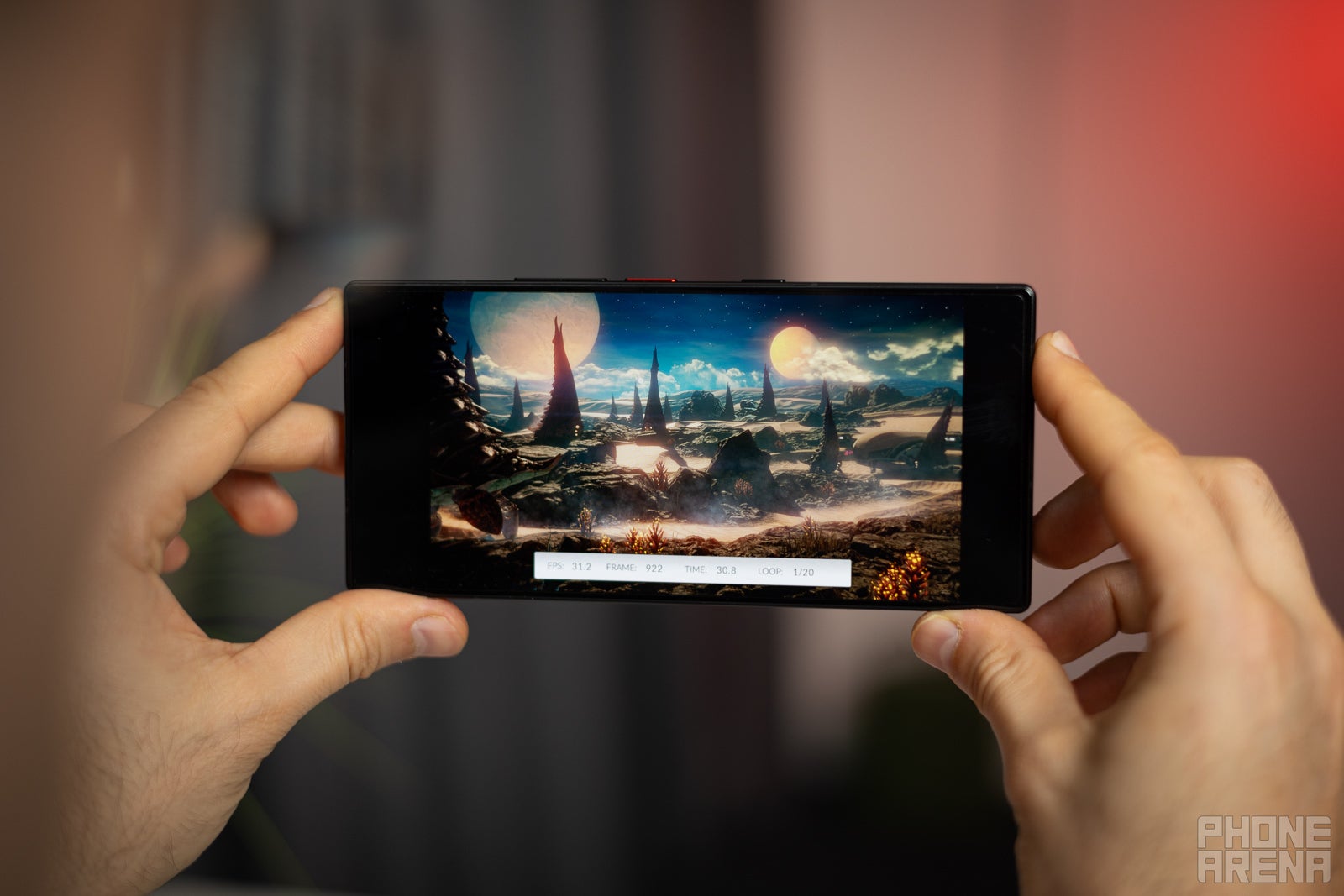
Hold this hottie with your fingertips
There are two sides when we talk about performance on a phone. On the one hand, we have all your benchmark numbers and scores, which can give you a quantitative measure of the phone’s performance. These are all fine and dandy, but they rarely translate into real-life experience. The truth is that smartphone processors have been fast enough for many years now.On the other hand, there’s the real-life feel of the phone. How fast you subjectively perceive it to be. These two angles sometimes cross, sometimes they’re far off, and sometimes they align perfectly. In the case of the Nubia, the real-life performance is top-notch; there is nothing to complain about. However, when it comes to benchmarks and stress tests, things are looking… let’s say, rather hot.
During our 3D Mark stress test, the phone failed to complete due to overheating and even shut itself down a couple of times. We were able to run the test in the fridge, which is not normal by any stretch of the imagination. Heavy games and apps also made the phone run hot, sometimes to the point of being unpleasant to hold.
The RAM and storage situation is very flexible, there are lots of variants, starting from a modest 8GB/256GB option and going all the way to the whopping 24GB of RAM on the 1TB model. You can get middle-ground models with 12GB and 16GB of RAM and 256GB or 512GB of onboard storage too.
Performance Benchmarks:
Nubia Z60 Ultra OS / Android version
There is other stuff adding to the navigation options, such as the Z-Pop (a pop-up window with shortcuts), the ZSmart SideBar (an edge-activated floating bar with apps and shortcuts), a floating window feature, and more.
All in all, the experience is smooth and uncluttered; you can forget about the added Nubia-specific features if they’re not your cup of tea and use the phone as a normal stock Android one.
The software support situation is a bit uncertain. On the Nubia website, we find this: At Nubia, we’re committed to providing regular system updates for up to 3 years from the date of purchase, ensuring your device’s performance and security.” It’s not perfectly clear whether it’s OS updates, security ones, or both.
But if we assume it’s three whole years of full software support, the Nubia Z60 Ultra will get the following Android versions:
Nubia Z60 Ultra Battery
Run, Forest, run!
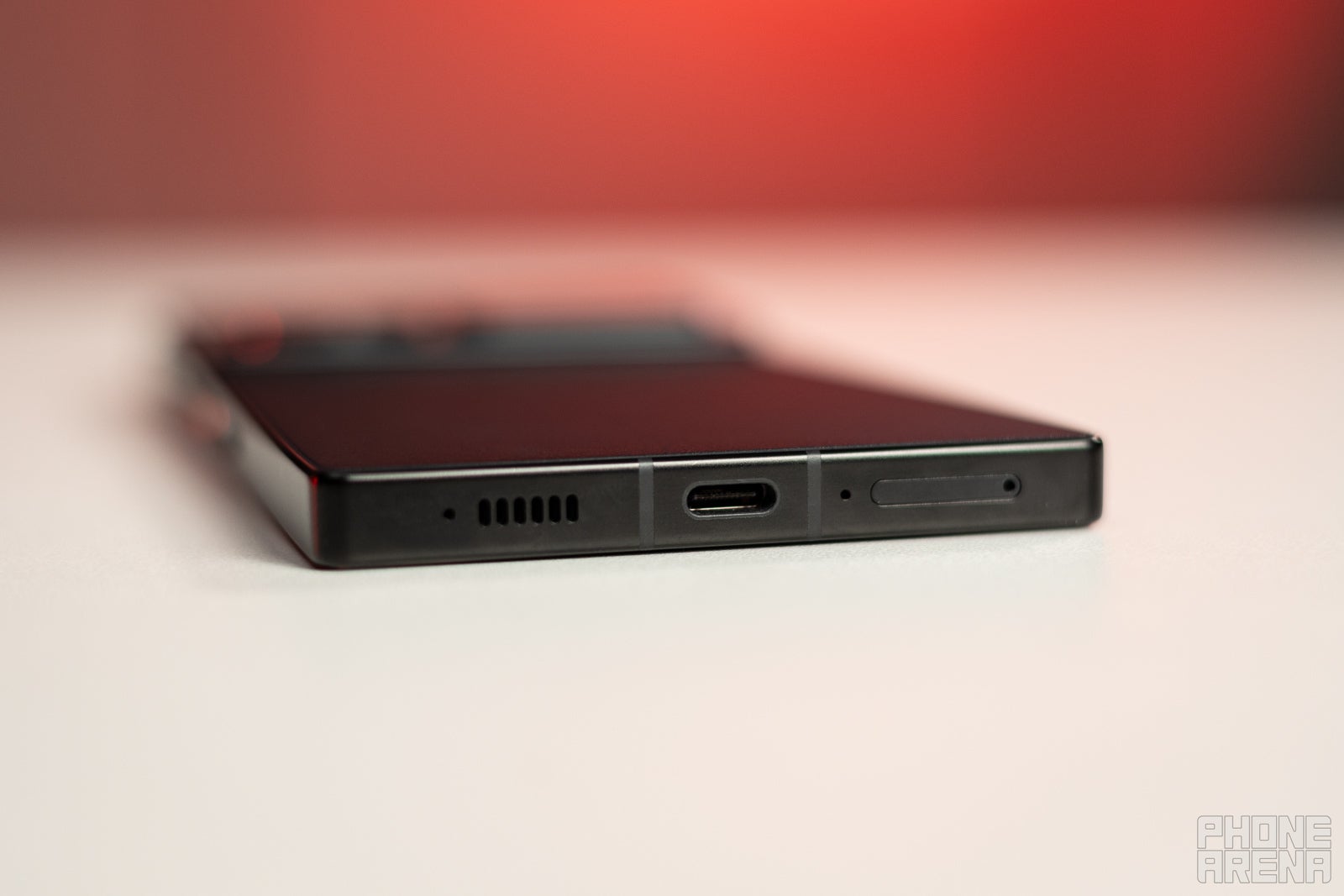
There’s one big advantage to having such a huge chassis. You can snug a huge battery inside as well. The Nubia Z60 Ultra comes with a 6,000mAh battery. Unsurprisingly, the phone manages to last two full days on a single charge easily, even if you use the 120 Hz refresh rate and put it through its paces.
PhoneArena Battery Test Results:
Our battery benchmark scores paint the same picture; the phone managed more than 17 hours of browsing, 11+ hours of YouTube streaming, and 6 and a half hours of gaming at 120 Hz. That’s very impressive, given the Snapdragon 8 Gen 3 inside and the big screen.
Nubia Z60 Ultra Charging Speeds
The not-so-great news is that there’s no wireless charging onboard, probably because the battery took up all of the space. Below, you will find the detailed charging profile.
PhoneArena Charging Test Results:
Nubia Z60 Ultra Audio Quality and Haptics
The sound is pretty loud, as you would expect with such a big phone, but it kind of lacks bass and gets a bit harsh at loud volume. The haptics are pretty strong and tight; there is nothing to complain about there.
There is no 3.5mm audio jack on this one, despite plenty of space to put one on.
Nubia Z60 Ultra Competitors
That being said, there are a slew of models that could challenge the Nubia Z60 Ultra on that front.
| Nubia Z60 Ultra Rivals | Advantages (over Nubia Z60 Ultra) |
Disadvantages (vs Nubia Z60 Ultra) |
|---|---|---|
| OnePlus 12 (MSRP $899.99) |
Brighter display Better ergonomics Wireless charging |
Selfie camera cutout Smaller battery More expensive |
| Asus ROG Phone 8 Pro (MSRP $1099.99) |
Dedicated for gaming Wireless charging Doesn’t overheat |
Two years of OS updates More expensive |
| Xiaomi 14 Pro (MSRP $799.99) |
Brighter screen Faster charging Titanium frame |
More expensive No edge-to-edge screen |
Looking at the table above, you probably get the picture. There are other Snapdragon 8 Gen 3 phones that offer sometimes even better features but they are inevitably more expensive, or in the case of the ROG Phone, lack in the camera department.
Nubia Z60 Ultra Summary and Final Verdict
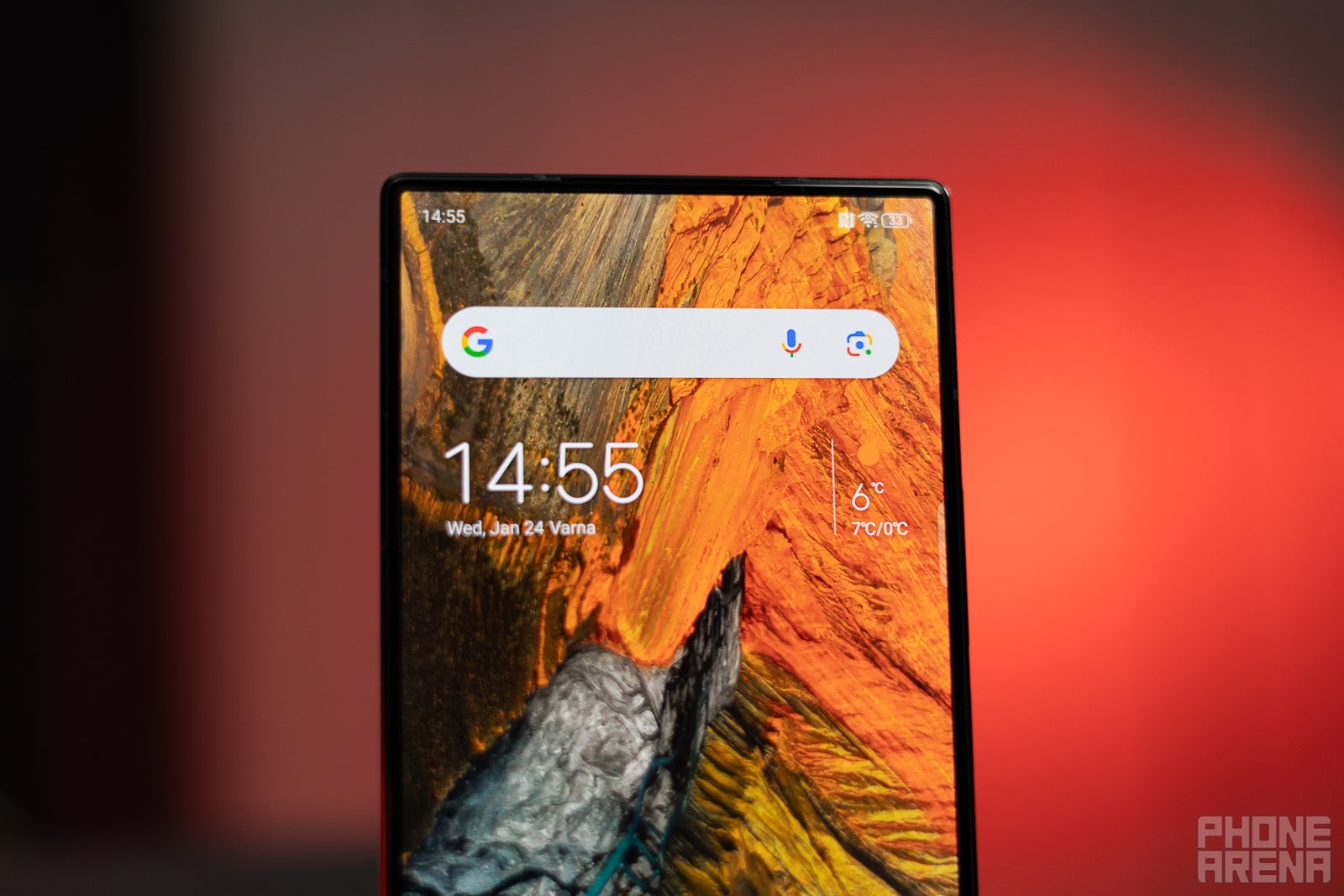
Well, here we are at the end of the review. Should you buy the Nubia Z60 Ultra? That’s a really tough question. This phone has a lot going on but there are some drawback we just can’t overlook. For one, it tends to get very hot under heavy load, and if you’re gaming a lot or using heavy apps, it might be an issue. Then there’s the form factor. The phone is huge and boxy, might not appeal to everyone.
On the other hand, this industrial design, paired with the latest Snapdragon, an ample camera system, and a great display with an almost invisible selfie camera, could very well justify the $599 starting price. One thing is certain, though. The era of the edge-to-edge display is nigh. It’s only a matter of time for the big guys to perfect the technology and get there. And if you want an early taste of that, the Nubia Z60 Ultra is a decent choice.
👇Follow more 👇
👉 bdphone.com
👉 ultraactivation.com
👉 trainingreferral.com
👉 shaplafood.com
👉 bangladeshi.help
👉 www.forexdhaka.com
👉 uncommunication.com
👉 ultra-sim.com
👉 forexdhaka.com
👉 ultrafxfund.com
